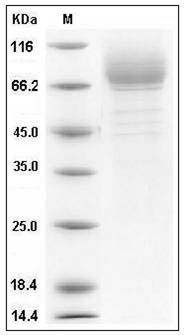-
Product Name
Human CD36/SCARB3 (His Tag) recombinant protein
- Documents
-
Description
The cluster of differentiation (CD) system is commonly used as cell markers in immunophynotyping. Different kinds of cells in the immune system can be identified through the surface CD molecules which associating with the immune function of the cell. There are more than 320 CD unique clusters and subclusters have been identified. Some of the CD molecules serve as receptors or ligands important to the cell through initiating a signal cascade which then alter the behavior of the cell. Some CD proteins do not take part in cell signal process but have other functions such as cell adhesion. Cluster of differentiation 36 (CD36), also known as FAT, SCARB3, GP88, glycoprotein IV (gpIV) and glycoprotein IIIb (gpIIIb), is a member of the CD system as well as the class B scavenger receptor family of cell surface proteins. CD36 can be found on the surface of many cell types in vertebrate animals and it consists of 472 amino acids and is extensively glycosylated. It is an integral membrane protein primarily serving as receptors for thrombospondin and collagen and by the erythrocytes infected with the human malaria parasite. The role of CD36 as a cell surface receptor has been extended to that of a signal transduction molecule.
-
Protein name
CD36 antigen (Collagen type I receptor, thrombospondin receptor)
-
Protein short names
CD36; PAS-4; GPIIIB; GP3B; PASIV; GP4; GPIV; FAT; SCARB3; PAS IV; CHDS7; BDPLT10
-
Uniprot ID
P16671
-
Gene Name
CD36; hCG_17062; tcag7.257
-
Source/Expression Host
Human Cells
-
Expression Plasmid/cDNA
A DNA sequence encoding the human CD36 (NP_001001547.1) extracellular domain (Gly 30-Asn 439) was fused with a polyhistidine tag at the C-terminus and a signal peptide at the N-terminus.
-
Protein Species
Human
-
Molecular weight
The secreted recombinant human CD36 comprises 420 amino acids with a predicted molecular mass of 48 kDa. As a result of glycosylation, the apparent molecular mass of rh CD36 is approximately 70-80 kDa in SDS-PAGE under reducing conditions.
-
Purity
> 88 % as determined by SDS-PAGE
-
Activity
Measured by its binding ability in a functional ELISA. Immobilized human CD36 at 20 μg/ml (100 μl/well) can bind biotinylated human RSPO1 with a linear ranger of 0.032-4 μg/ml.
-
Validations

Human CD36 / SCARB3 Protein (His Tag) SDS-PAGE
Related Products / Services
Please note: All products are "FOR RESEARCH USE ONLY AND ARE NOT INTENDED FOR DIAGNOSTIC OR THERAPEUTIC USE"
